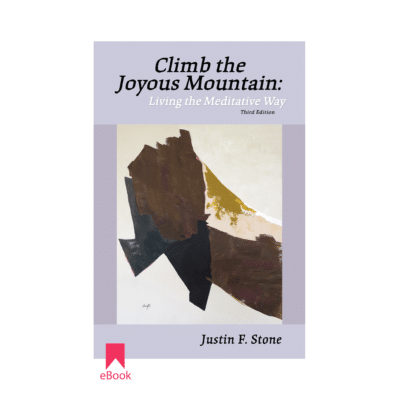
Reading Climb the Joyous Mountain, we are touched by Justin’s lyrical poetry and deep appreciation of life. He genuinely connects with people, places, and situations because he doesn’t bring a personal agenda. Justin asks, “Does writing about the ‘Joyous Mountain’ make one more joyous?” He honestly answers “I don’t know.” Yet Justin’s amazing wisdom is helpful and healing. His pervasive freedom allows readers to enter an unusual state of consciousness. The stories and ideas Justin offers are expressed with great simplicity, the hallmark of a master.
As he introduces his meditative way of life, Justin begins by describing a meditation experience. And he gives details about how to meditate and what to expect during meditation. If sincerity and peace are important to you, this alone would be worth the cover price.
To set an early tone, Justin paints a mood (an intimate portrait really) of one of his many years in Kyoto. And he talks of the old world Wabi-Sabi feeling evidenced in a Japanese tea ceremony.
In “The Mysterious 108,” Justin doesn’t answer why the number 108 is so important in the Southeast Asian spiritual traditions. But, as usual, he simply opens our minds to the inquiry.
Similarly, Justin doesn’t offer a workable philosophy welding Taoism and Indian Buddhism, but he makes it clear that the sensory represents ignorance. Simplicity is definitely his way. Through inquiry the mental is outgrown and is supplanted by experience, which in time blooms into wisdom.
Justin is also a consummate poet. Using his unique form of Pyramid Poetry, we may also experience the poetry within ourselves. Through this new form, our consciousness is able to come into laser focus. For those who’ve always wanted to write poetry but have been fearful of attempting it, this simple form can reveal the wonders of our own inner landscape.
By sharing several episodes from his life, Justin shows the risks and great benefits of following life’s “Grand Plan” – even though life’s grand plan isn’t always what we think. The key, though, is a willingness to lose our preconceived notions. Justin gives an example with the I Ching. How could he possibly know that the little red book of mathematical discussions (based on the I Ching) given to him in Hong Kong would cause great delight – years and years later – to his honored friend Professor Wen-Shan Huang in California.
Justin includes “A Prayer Before Meals for Buddhists and Others” because it is has been part of his daily life for decades. Great teachers like Justin Stone teach from wisdom, experience, and example. It is quite touching to watch Justin pray before meals; it’s rarely out loud and never for show. His gratitude to and for life helps us appreciate the many gifts we receive daily. It instantly inspires.
On a personal note, what a treat it is to be introduced to Justin’s good friend – painter, philosopher, poet, and musician Ou Mie Shu. His art and poetry show that with heart, a new understanding to life can be formed and lived.
With a keen awareness of the human condition, Justin delves into the causes of suffering. He suggests there is a cure for suffering – that “Joy is mankind’s heritage.” But Joy requires an attitude change. Justin masterfully shows us the difference between paths of self-discipline and paths of complete surrender. Which will we choose? “Only by cultivating ourselves will the Life Force change.” There are those who Know; Justin makes it clear that each of us has that potential.
Ramana Maharshi said that finding Truth was simple – all we had to do was ask, “Who Am I?” To his great benefit and ours, Justin did not take this edict casually but rather, he gave it his full attention. The chapter entitled “Who Am I?” touches readers to the core. So many spiritual students have worked for years wondering if they would fulfill the prize of spiritual Enlightenment. The poignant passages Justin highlights in this chapter are more like living water than mere words – water that quenches the thirst of parched spiritual students. Justin invites us to drink of the living water and truly live ourselves, our lives.
Over and over again we hear that the wise ones are not given to heights and depths of emotion. How often is that our first response? Again, Justin gives a typically simple solution – give thanks now. Only then do we enter the simplicity of teh (inner sincerity). Only then can we respond to daily life like holy beings rather than monkeys. It is our destiny to be Real rather than to be imitators of life.
Lastly, in Justin’s view, only one thing keeps us from the sublime: our small mindedness. He has seen enough of the world to know that underneath it all, within each of us, silence speaks and gives rise to full possibility. “This spiritual seed then makes it possible for us to Climb the Joyous Mountain.”
May 2008
Carmen L. Brocklehurst
Host of the PBS television show, T’ai Chi Chih, Joy Thru Movement, produced by KNME-TV Albuquerque, New Mexico.
Get the interviews between Carmen and Justin that appeared on this TV program here.

